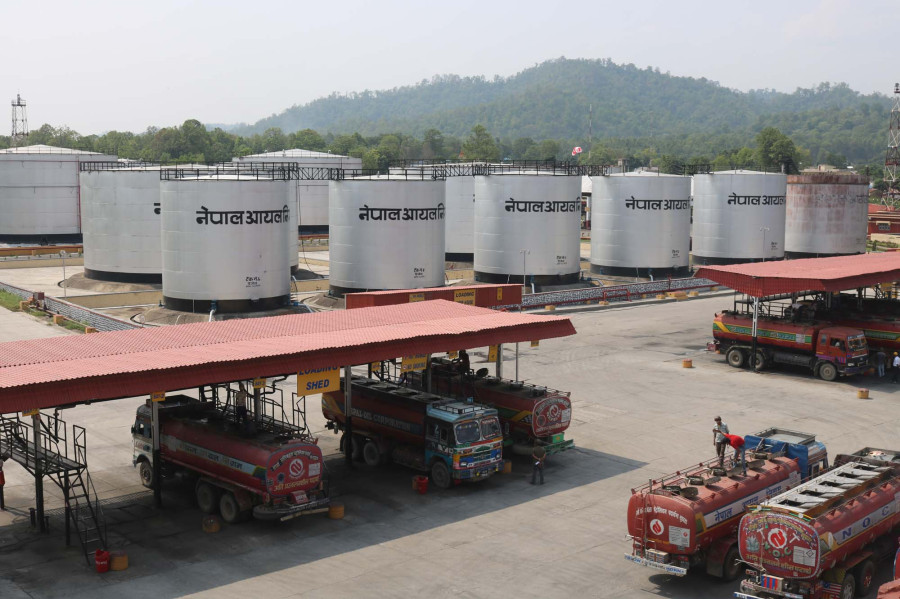Money
Government balks at deregulating the money-making petroleum sector
The reluctance to loosen its grip on the oil trade may be due to Nepal Oil Corporation's massive revenues, say industry watchers.
Krishana Prasain
It has backtracked on its long-standing pledge to break the monopoly of the state-owned company which has total control over the import and distribution of gasoline in Nepal.
Addressing the company's 50th anniversary celebration on Saturday, Minister for Industry, Commerce and Supplies Lekhraj Bhatta said that the government would not open up the oil trade to the private sector. “In view of national security, petroleum is sensitive. Therefore, I think we should not bring the private sector into the oil business.”
All the gasoline sold in Nepal comes from India, and experts have been saying that the cross-border pipeline that opened last September makes perfect sense for bilateral trade and economic advantage, but they worry that it could make the country even more dependent on the southern neighbour and exclude the private sector from the oil trade.
The government's reluctance to loosen its grip on the oil trade may have been prompted by the massive revenues Nepal Oil Corporation has been raking in recently, say industry watchers.
The state-owned firm is in the midst of a profit bonanza due to increased development projects and rising incomes of Nepalis.
In the last fiscal year, the corporation made a net profit of Rs7.5 billion on oil imports valued at Rs216 billion. It paid Rs63.85 billion in taxes to the government.
Nepal Oil Corporation also raised Rs11.95 billion in infrastructure tax for the construction of the Budhi Gandaki Hydropower Project. Business has been booming after the company adopted automatic pricing mechanism in 2014.
The corporation has been subsidising cooking gas with the extra revenues generated by selling high-priced aviation fuel to international and domestic airlines. It makes a profit of Rs45 on a litre of aviation fuel sold to international carriers.
Currently, the corporation reviews cooking gas prices monthly and prices of other petroleum products on a fortnightly basis.
Economist Jagdish Chandra Pokharel said that if the state thinks it can do all the business, it is discouraging the private sector.
“Business monopoly is not good for any country. At a time when the government has been announcing public-private partnership model in every venture, it should not hold all key businesses.”
Economist Deependra Bahadur Kshetry, however, said that bringing the private sector on board will not resolve all the issues.
“The supply chain or state efficiency will not improve automatically if the private sector enters the business,” he said. There are several instances of problems occurring in supply with the private sector creating havoc in the market by hoarding products, he added.
Nepal Oil Corporation was once a chronic loss maker. In 2015-16, the company announced it had finally become debt-free after 14 years. Once heavily in debt with outstanding loans totaling Rs36.87 billion, the corporation paid off all the loans in the past one year and a half—thanks to falling oil prices in the international market.
The corporation had started taking loans from the government and various banks and financial institutions since 2002, which had swollen to Rs36.87 billion in January 2015.
The corporation’s financial position started to weaken in the fiscal year 2002-03 when world petroleum prices went into an upward spiral.
Oil prices peaked at $147 per barrel in 2007. Falling prices in 2014 and the automatic price mechanism helped improve its financial health. Brent crude fell to $27.67 a barrel in January 2016—the lowest since 2003.
At least a dozen reports containing recommendations for the improvement of the corporation are gathering dust on government shelves.
Several high-level petroleum sector reform taskforces have recommended ending the monopoly of Nepal Oil Corporation.
But since 2016, the government remained silent putting all recommendations on the back burner, as the corporation started to earn profits and the construction of the cross-border pipeline started.
Minister Bhatta also said that the government was enacting the Petroleum Act as the oil market had grown to over $2 billion annually, saying that the private sector would not be included in the lucrative oil business now.




 20.12°C Kathmandu
20.12°C Kathmandu














